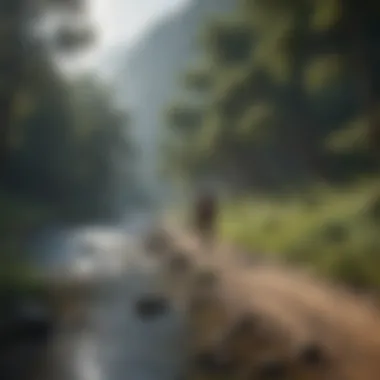Ultimate Guide to Backcountry Camping: Expert Tips for Wilderness Exploration


Overview of Backcountry Camping
Backcountry camping is an exhilarating outdoor adventure that involves venturing into remote wilderness areas far from established campsites. This form of camping requires self-sufficiency, as individuals must carry all necessary supplies on their back to survive in the wild. Embracing the raw beauty of nature, backcountry camping immerses enthusiasts in unspoiled landscapes, offering a deeper connection to the environment.
Current Environment and Challenges
The current status of backcountry camping presents both opportunities and challenges. While it allows individuals to escape the trappings of modern life and experience authentic solitude in nature, it also raises concerns about environmental impact and safety. Challenges such as habitat disturbance, waste management, and human-wildlife encounters need to be addressed to ensure the long-term sustainability of backcountry camping.
Sustainable Practices and Solutions
To address the challenges faced by backcountry camping, adopting sustainable practices is paramount. Utilizing Leave No Trace principles, which encompass minimizing campsite impact, properly disposing of waste, and respecting wildlife, is crucial for minimizing environmental harm. Additionally, promoting education on wilderness ethics and implementing regulations for backcountry use can contribute to the preservation of pristine natural areas.
Impact on Ecosystems and Communities
The impact of backcountry camping extends beyond individual experiences to influence ecosystems, communities, and future generations. Intensive camping activities can lead to soil erosion, vegetation trampling, and wildlife disruption, affecting the delicate balance of natural habitats. Furthermore, the exploration of sustainable camping practices can foster environmental stewardship in communities and instill a sense of responsibility for conserving wilderness areas for future enjoyment.
Introduction to Backcountry Camping
Backcountry camping is a venture into the remote wilderness, a journey that requires meticulous planning and a particular set of skills. In this comprehensive guide to backcountry camping, we delve into the essence of this outdoor activity, highlighting the essential aspects that define it. From understanding the significance of connecting with nature to navigating the challenges of isolation and self-reliance, each element contributes to making backcountry camping a truly immersive experience.
Understanding Backcountry Camping
Definition and Concept
Exploring the wilderness through backcountry camping involves venturing into untamed territories far from the comforts of civilization. The core essence of this activity lies in embracing nature's raw beauty and unpredictability. While some may find solace in the solitude it offers, others may seek the thrill of self-reliance amidst the rugged terrain. This unique blend of adventure and serenity is what sets backcountry camping apart from traditional outdoor excursions. The freedom to explore uncharted landscapes and test one's limits adds a sense of authenticity to the outdoor experience.
Benefits of Backcountry Camping
Connection with Nature
Immersing oneself in the natural environment during backcountry camping fosters a profound connection with the Earth. The absence of modern distractions allows campers to tune into the sights, sounds, and rhythms of the wilderness. This deep bond with nature offers a holistic escape from urban life, promoting mental clarity and spiritual rejuvenation.
Solitude and Serenity


One of the primary allurements of backcountry camping is the coveted tranquility it provides. Escaping the noise and clutter of the city, campers find solace in the peaceful embrace of the wild. The serene vistas and unperturbed surroundings create a meditative ambience conducive to introspection and relaxation.
Challenges of Backcountry Camping
Risks and Hazards
Embarking on a backcountry camping expedition comes with its fair share of risks and hazards. From encountering wildlife to navigating treacherous terrain, campers must be prepared for unpredictable situations. Adhering to safety protocols and equipping oneself with the necessary skills are crucial in mitigating potential dangers.
Isolation and Self-Reliance
The solitude experienced in backcountry camping, while rejuvenating, can also pose challenges related to self-reliance. Campers must be self-sufficient in handling emergencies and basic survival tasks. The isolation from conventional comforts necessitates a resilient mindset and a resourceful approach to tackling adversities.
Preparation and Planning
In the realm of backcountry camping, preparation and planning stand as the foundational pillars for a successful excursion. The significance of meticulous preparation cannot be overstated when venturing into the remote wilderness. Prior to embarking on any backcountry journey, it is imperative to carefully select the appropriate gear, strategize route planning, and familiarize oneself with essential safety measures. Effective preparation and planning not only enhance the overall experience but also ensure the safety and well-being of the camper.
Selecting the Right Gear
Tent and Sleeping Bag
When delving into the selection of gear for backcountry camping, the tent and sleeping bag play a pivotal role in providing shelter and comfort during outdoor expeditions. The choice of a high-quality tent and sleeping bag can significantly impact the camper's overall experience. Opting for lightweight yet durable materials is paramount for ease of transport without compromising on durability. Ensuring proper insulation and weatherproofing features in the sleeping bag is vital for withstanding various environmental conditions. While the tent offers shelter, the sleeping bag guarantees a restful night's sleep amidst the wilderness. Proper selection of these items can elevate the camping experience and contribute to a successful expedition.
Food and Cooking Supplies
The realm of backcountry camping encompasses not only the exploration of nature but also mastery in the art of outdoor cooking. Food and cooking supplies play a crucial role in sustaining energy levels during the expedition. Choosing lightweight and high-energy food options is essential for maintaining nutrition while minimizing the burden of carrying heavy supplies. Investing in compact cooking equipment that is easy to transport and efficient in preparing meals is key. Balancing nutritional needs with convenience is vital to ensuring a seamless culinary experience in the wilderness.
Navigation Tools
Navigating the wild terrain of the backcountry requires the adept use of navigation tools to ensure a safe and successful journey. Topographic maps offer detailed insights into the landscape, aiding in route planning and terrain understanding. Pairing traditional maps with the modern technology of GPS devices provides a comprehensive navigational toolkit for campers. While topographic maps offer a tactile and reliable means of navigation, GPS devices enhance precision and real-time tracking capabilities. Employing a combination of these tools empowers campers with the necessary guidance to traverse the wilderness with confidence and accuracy.
Essential Skills and Safety Measures
In the realm of backcountry camping, mastering essential skills and safety measures is paramount to a successful expedition. These skills encompass a wide range of abilities crucial for surviving and thriving in the wilderness. From understanding how to build a fire safely to selecting optimal campsites, each aspect plays a significant role in ensuring one's well-being. At the core of essential skills lies the ability to navigate the outdoors confidently and responsibly. These measures not only enhance the camping experience but also promote a deeper connection with nature.


Fire Building and Campsite Selection
Fire Safety Guidelines
When it comes to fire safety guidelines, meticulous attention to detail is key. Understanding the principles of fire safety not only prevents accidents but also safeguards the natural environment. By adhering to proper fire-building techniques and following established guidelines, campers can minimize the risk of wildfires and ensure a safe camping experience. Emphasizing the importance of fire safety in this article sheds light on the delicate balance between enjoying a fire responsibly and preserving the wilderness's integrity.
LNT Campsite Ethics
Within the realm of campsite ethics, Leave No Trace (LNT) principles reign supreme. These guidelines advocate for minimal impact practices, advocating for responsible outdoor behavior and conservation efforts. Incorporating LNT campsite ethics into backcountry camping not only cultivates a sense of environmental stewardship but also fosters a sustainable approach to outdoor recreation. By embracing LNT principles, campers contribute to the longevity and preservation of natural ecosystems, underscoring the significance of ethical camping practices.
Wildlife Awareness
In the wild, being attuned to wildlife and their behaviors is crucial for both camper safety and animal welfare. Understanding how to coexist with wildlife harmoniously is a fundamental aspect of backcountry camping. Bear safety tips serve as a cornerstone of wildlife awareness, offering practical insights into mitigating potential risks and fostering respect for these majestic creatures. Learning how to deal with wildlife encounters empowers campers to act calmly and judiciously in unexpected situations, prioritizing safety and environmental preservation.
Dealing with Encounters
Navigating encounters with wildlife demands composure and preparedness. By equipping oneself with the knowledge and skills to handle such situations effectively, campers can mitigate risks and promote mutual respect between humans and animals. Dealing with encounters underscores the importance of proper wildlife etiquette and situational awareness, emphasizing a proactive approach to wildlife interactions. By elucidating the nuances of dealing with encounters, this article equips readers with essential insights to navigate wilderness scenarios with confidence and prudence.
Emergency Preparedness
Amidst the unpredictability of the wilderness, being prepared for emergencies is non-negotiable. Ensuring one possesses adequate first aid essentials can make a difference in critical situations, potentially saving lives. Understanding survival techniques further bolsters one's ability to overcome challenges and adversities in remote settings. By delving into the realm of emergency preparedness, this article empowers readers to approach backcountry camping with informed caution and readiness.
First Aid Essentials
The cornerstone of emergency preparedness lies in comprehensive first aid essentials. Equipping oneself with a well-rounded first aid kit and knowledge of basic medical procedures can mean the difference between a minor incident and a life-threatening emergency. Highlighting the significance of first aid essentials underscores the proactive approach to health and safety in the wilderness, accentuating the importance of being self-sufficient and prepared.
Survival Techniques
Survival techniques are a critical component of backcountry camping, offering campers essential skills to navigate challenging situations. From building shelters to sourcing food and water, these techniques provide invaluable knowledge for thriving in austere environments. By shedding light on survival strategies, this article equips readers with the confidence and competence to tackle unforeseen emergencies and emerge resilient. Understanding the nuances of survival techniques is indispensable for those venturing into the wilderness, amplifying their capacity to endure and triumph over adversity.
Immersion in the Natural Environment
Nature Photography


Capturing Wildlife
Delving into the specific realm of capturing wildlife through photography is a pivotal aspect of immersing in the natural environment. This practice enables individuals to encapsulate raw moments of wildlife in their natural habitat, emphasizing the beauty and diversity of the fauna residing in the wilderness. The key characteristic of capturing wildlife lies in its ability to evoke a sense of awe and appreciation for the untamed creatures that coexist with us. It serves as a visual narrative of the symbiotic relationship between humans and wildlife, shedding light on the importance of conservation and preservation efforts.
Scenic Landscapes
On the other hand, focusing on capturing scenic landscapes offers a unique perspective on the natural beauty that envelops backcountry camping experiences. By immortalizing picturesque vistas through photography, individuals can preserve the grandeur of untouched landscapes for posterity. The key characteristic of scenic landscapes lies in their ability to evoke emotions of tranquility and wonder, resonating with the untouched magnificence of nature. Despite the challenges of capturing landscapes in their raw form, the rewards of preserving these ephemeral moments through photography are truly incomparable.
Stargazing and Night Sky Observations
Identifying Constellations
The skill of identifying constellations plays a crucial role in enhancing the nocturnal experience in the wilderness. By being able to pinpoint and name constellations, individuals can navigate the night sky with a heightened sense of wonder and curiosity. This ability contributes to a deeper understanding of the celestial world above, offering a sense of connection to something vast and timeless. The unique feature of identifying constellations lies in its capacity to inspire contemplation and introspection, unlocking a sense of awe towards the cosmos.
Aurora Borealis
Conversely, the phenomenon of the Aurora Borealis presents a rare and captivating spectacle that truly mesmerizes those fortunate enough to witness it. Its swirling lights paint the night sky with vibrant hues, captivating viewers with its ethereal dance. The key characteristic of the Aurora Borealis lies in its transient and dazzling display, symbolizing the majestic beauty and unpredictability of nature. Despite its elusiveness, the Aurora Borealis embodies a celestial marvel that evokes a sense of wonder and insignificance in the vast universe.
Plant and Animal Identification
Edible Plants
Understanding edible plants is a fundamental skill that enhances the backcountry camping experience by providing sustenance from the natural environment. Identifying edible plants not only broadens one's knowledge of flora but also ensures survival in case of emergencies. The key characteristic of edible plants lies in their dual purpose of nourishment and risk mitigation, highlighting their importance in foraging practices. While the advantages of utilizing edible plants are evident, the disadvantages stem from the cautious approach required in differentiating between safe and toxic vegetation.
Track and Sign Interpretation
Interpreting tracks and signs of animals crafts a narrative of the fauna inhabiting the wilderness, enriching the understanding of their behaviors and movements. This skill deepens the connection to nature by unraveling hidden stories etched on the forest floor or within the terrain. The key characteristic of track and sign interpretation lies in its ability to transform simple markings into meaningful insights, offering a glimpse into the lives of wildlife. However, the challenge lies in accurately deciphering these signs amidst the complexities of the natural world, requiring patience and astute observation for a rewarding experience.
Conclusion
In the dynamic realm of backcountry camping, the conclusion serves as the pinnacle of reflection and growth. Delving into the essence of the backcountry experience, it encapsulates the essence of solitude, self-reliance, and communion with nature. As adventurers wrap up their expedition, the conclusion offers a platform for introspection and assimilation of lessons learned along the rugged trails. It acts as a compass guiding individuals towards future outings while imprinting lasting memories of the wilderness on their souls. By pondering the depths of the journey, one can unravel newfound perspectives and celebrate the triumphs and challenges encountered amidst the untamed terrain.
Reflecting on the Backcountry Experience
Lessons Learned
Embarking on a backcountry escapade unveils a trove of invaluable lessons that resonate beyond the realm of outdoor adventures. The concept of 'Lessons Learned' signifies a repository of experiences garnered from confrontations with nature's raw beauty and unforgiving elements. These lessons stand as beacons of wisdom, illuminating the path towards improved preparedness, resilience, and adaptability in the face of uncertainty. By dissecting each challenge faced, individuals extract essential knowledge, refining their skills and instincts for future exploits.
Future Expeditions
As the embers of one journey cool, the allure of future expeditions beckons with promises of newfound horizons and uncharted territories. 'Future Expeditions' embody the spirit of continual growth and exploration, fueling the insatiable thirst for discovery and adventure. They represent stepping stones towards personal evolution, calling individuals to venture forth into the vast tapestry of the natural world with renewed vigor and curiosity. Each future expedition holds the potential to sculpt unforgettable memories, forge unbreakable bonds, and unravel the mysteries of the wilderness, perpetuating the eternal dance between man and nature.



